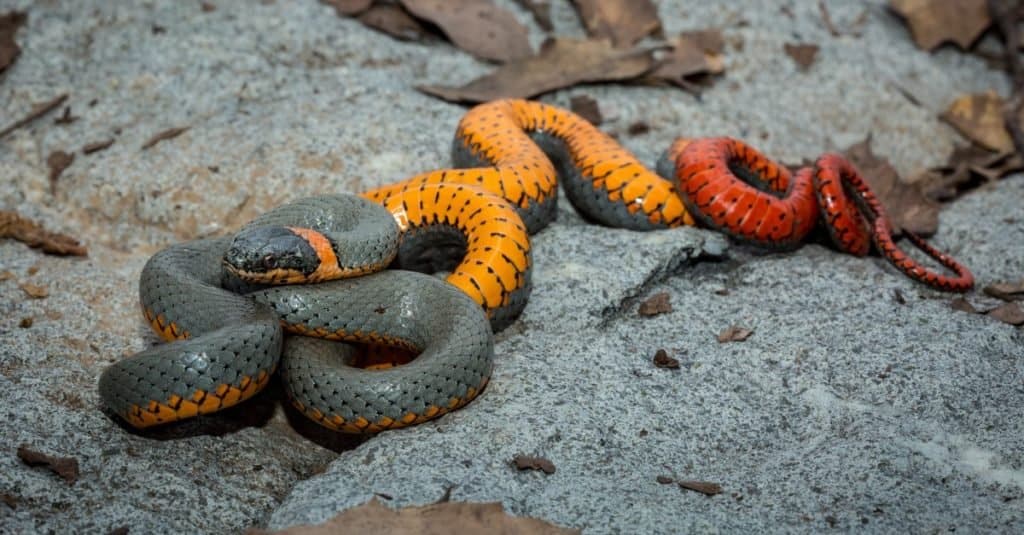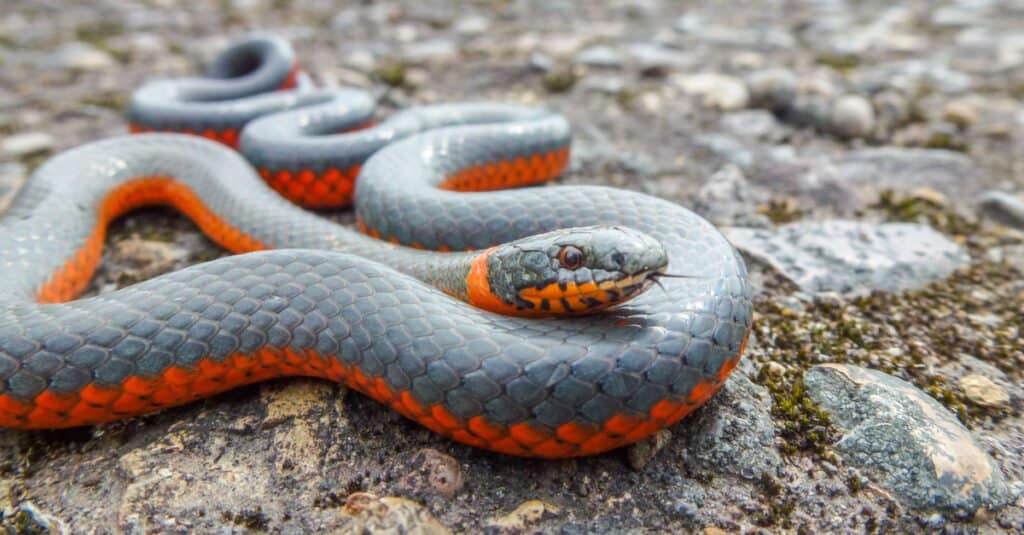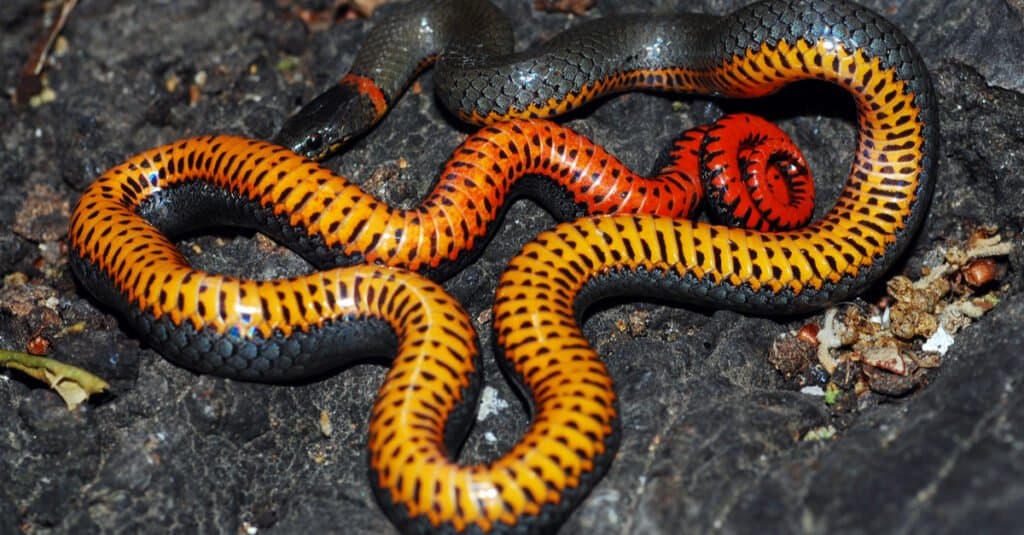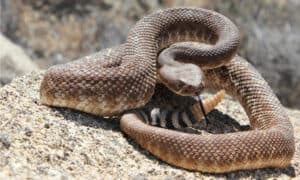Quick Answer
- Ringneck snakes are not dangerous to humans. While they do have mildly venomous saliva and Duvernoy’s glands it is not harmful to humans, and they rarely barely bite.
- Despite not having potent venom, ringneck snake bites may still contain bacteria, so it is highly advised to wash the bite wound right away to prevent infection.
Ringneck snakes seem like the perfect pets – slender bodies with colorful bellies adorned with a ring around their necks. Their ring alone looks like a collar, making them one of the best choices for pets! But before taking them in as pets, most people hesitate, wondering if they pose a threat to humans. So, are ringneck snakes poisonous or dangerous?
Apart from their adorable appearance, ringneck snakes are docile and are not harmful to humans. They are not aggressive and do not bite and would rather coil up than bite when provoked. Most people think that ringnecks are not venomous because they do not have actual venom glands. However, they possess a weak venom in their saliva that paralyzes their prey before consumption. This weak venom is not harmful to humans, making ringnecks a good choice for pet snakes, especially for beginners.
Do Ringneck Snakes Bite?

Ringneck snakes rarely bite.
©Michael K. McDermott/Shutterstock.com
Like any other snake species, ringneck snakes can bite, but only on extreme occasions. And even if they do, they wouldn’t be able to use their back fangs in the bite, so it wouldn’t hurt and would only leave a few bite marks.
Ringneck snakes are naturally shy, and docile, and do not attack humans. They would slither away and hide rather than face confrontation. While most snakes bite when they feel threatened or provoked, ringneck snakes are less likely to do so. Ringneck snakes will coil up to hide from predators when threatened. In the wild, ringneck snakes can only grow to a maximum of 30 inches, making them less effective in defending themselves from predators and other larger creatures. Moreover, ringneck snakes are mostly domesticated and are used to being handled, so holding them with care will not make them bite you.
Besides being naturally docile, ringneck snakes are not equipped with large jaws to bite humans. Due to their small size, ringneck snakes cannot open their jaws wide enough to inflict harmful wounds on humans, no matter how hard they try. Unlike most venomous snakes equipped with sharp fangs at the front of their mouth, ringneck snakes don’t have fangs. Instead, they have enlarged teeth in the back of their mouths that puncture their prey so their venomous saliva can work its way in.
For years, biologists have considered ringneck snakes non-venomous because they lack the typical anatomical structure of most venomous snakes. Venomous snakes usually sport venom glands that supply venom to their fangs, and these fangs have hollow tubes that will then deliver the venom to their prey or adversaries. But even though ringneck snakes do not have venom glands, scientists have discovered that they have something somewhat similar, called Duvernoy’s glands. These glands produce very weak venom that helps them immobilize and kill smaller animals for food.
Are Ringneck Snakes Dangerous to Humans?

As they barely bite and have weak venom, ringneck snakes aren’t dangerous to humans.
©Tom Fenske/Shutterstock.com
Ringneck snakes are not dangerous to humans. While they have a very weak venom in their saliva, ringneck snakes barely bite humans. They are among the best snakes to keep as pets for many reasons. Apart from their passive and submissive nature, ringneck snakes only bite very rarely and on extreme occasions. Moreover, ringneck snake bites are not strong enough to cause allergies and other snakebite symptoms, so they are extremely safe to handle and even keep as pets. The worst possible scenarios resulting from a ringneck snake bite are mild bleeding, swelling, and bruising.
There are two subspecies of ringnecks: the Northern and the Southern ringneck snake. Neither of the two is dangerous, and both species only have mild venom in their saliva that is potent enough to subdue their prey but not to harm people and larger animals. In the wild, ringneck snakes are predators of smaller animals, but they are also food for other larger animals and even larger snake species. Apart from their venom only being strong enough to kill their prey it is also not designed to fight predators. The ringneck snake’s venom is not used primarily for defensive measures but only for killing prey. It is considered entirely ineffective for humans, rendering ringneck snakes harmless.
Are Ringneck Snakes Venomous?

Ringneck snakes are slightly venomous and not poisonous.
©Jason Mintzer/Shutterstock.com
In the animal kingdom, having bright colors, especially for reptiles and amphibians, indicates how poisonous an animal can be. The ringneck snake may have colorful underbellies and rings around its neck, but these creatures are not poisonous or venomous. Ringneck snakes are slightly venomous, but their venom is not fatal, nor does it affect humans and other larger animals. Therefore, it is very safe to handle a ringneck snake because not only are they used to being handled, but they will also not bite you unless you hurt them. And even if they do so, the bite won’t hurt and will only feel like a mild sting. Despite not having potent venom, ringneck snake bites may still contain bacteria, so it is highly advised to wash the bite wound right away to prevent it from getting infected.
Are Ringneck Snakes Venomous to Dogs?
Ringneck snake venom cannot induce harm to dogs, and in most cases, ringnecks are not venomous or dangerous to dogs. The bite of a ringneck snake may not be enough to penetrate through a dog’s coat. However, ringneck bites can sometimes trigger some allergic reactions in dogs that may need medical attention.
Since the ringneck snake’s venom is only effective on smaller prey, it does not harm larger animals such as dogs. While they are known constrictors, ringneck snakes are not big enough to pose a threat to constricting dogs. Dogs can be curious and natural explorers, driving them to poke ringneck snakes occasionally. Ringneck snakes are relatively timid and often coil up and hide rather than attack.
The photo featured at the top of this post is © Tom Fenske/Shutterstock.com
Discover the "Monster" Snake 5X Bigger than an Anaconda
Every day A-Z Animals sends out some of the most incredible facts in the world from our free newsletter. Want to discover the 10 most beautiful snakes in the world, a "snake island" where you're never more than 3 feet from danger, or a "monster" snake 5X larger than an anaconda? Then sign up right now and you'll start receiving our daily newsletter absolutely free.
Thank you for reading! Have some feedback for us? Contact the AZ Animals editorial team.







